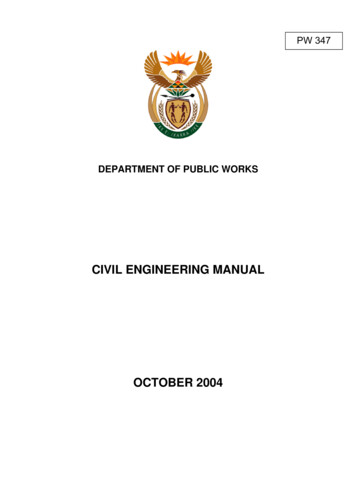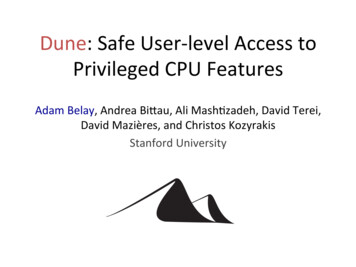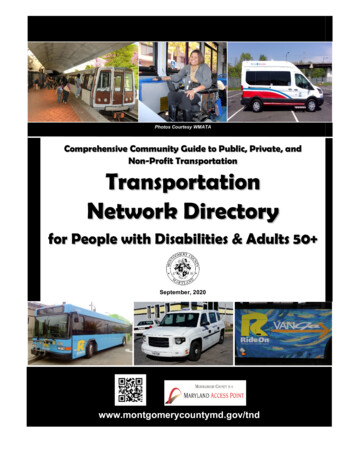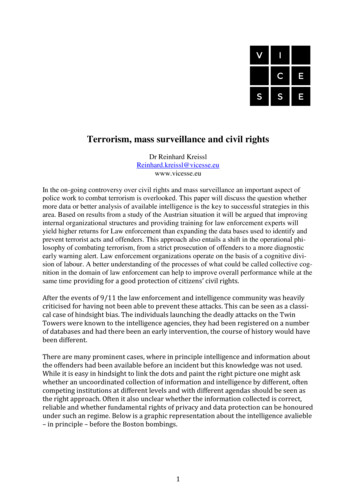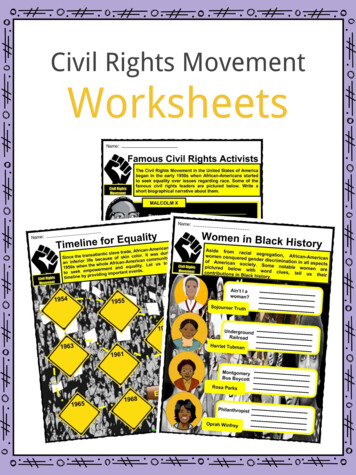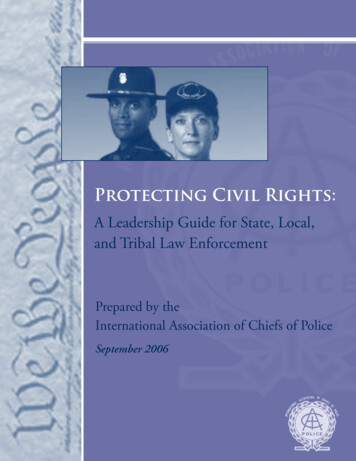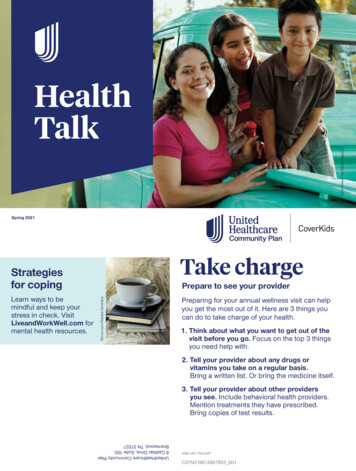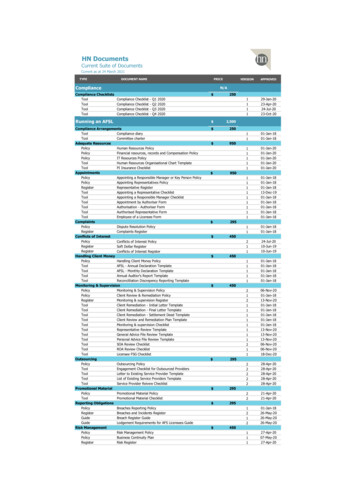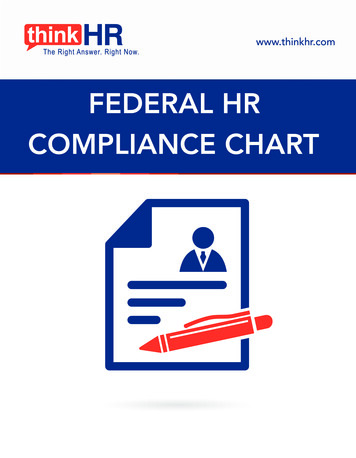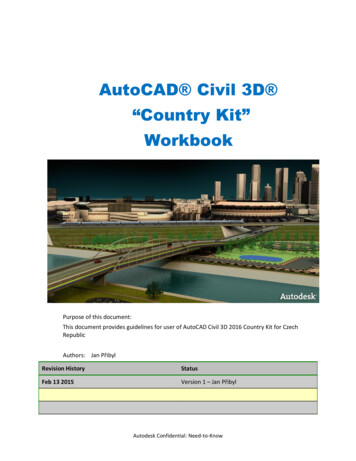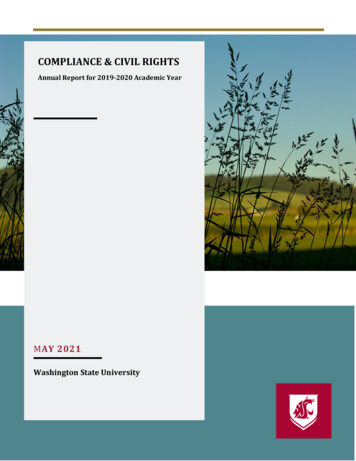
Transcription
COMPLIANCE & CIVIL RIGHTSAnnual Report for 2019-2020 Academic YearMAY 2021Washington State University1
To the WSU CommunityHolly Ashkannejhad, Director Title IX CoordinatorWelcome to WSU Compliance and Civil Rights’ annual report. The purpose of thisreport is to provide greater transparency about the activities of Compliance andCivil Rights (CCR), including information about complaints, investigations,outcomes, outreach and compliance activities. We also hope to continue to engagethe WSU community in these topics and spark interest and activity related tocompliance and investigation. Of particular note, addressing discrimination,harassment, and sex and gender based violence takes a unified effort, and we relyon our community partners to ensure WSU is taking system-wide steps toproactively meet compliance obligations, and to prevent, respond to, and addressmisconduct.For more information about CCR, please visit our website at ccr.wsu.edu.2
Executive SummaryCompliance & Civil Rights OverviewCompliance and Civil Rights (CCR) is responsible for central compliance supportfor the WSU system and for providing technical guidance to the universitycommunity about equal opportunity, Title IX, Title VII, ADA, Affirmative Action,Clery Act, HIPAA, Uniform Health Care Information Act, and other state andfederal civil rights and health sciences laws and regulations. CCR also serves asthe central resource for complaints under the WSU Policy ProhibitingDiscrimination and Harassment, Executive Policy 15 (EP 15), providinginvestigations, consultations, informal resolutions, and referrals, as appropriate.For more information about CCR, please visit our website: ccr.wsu.edu.Meet our TeamDirectorHolly Ashkannejhad, J.D.Director – Compliance & InvestigationTitle IX CoordinatorComplianceDaniel B. Records-Galbraith, J.D.Assistant Director – Civil RightsADA CoordinatorSally MakamsonAssistant Director – Health SciencesMonica S. CollinsAffirmative Action AssistantHR Consultant/AssistantAlexis E. GuseCompliance Program CoordinatorInvestigationJenna Van Klaveren, J.D.Lead Civil Rights Investigator/CoordinatorDeputy Title IX Coordinator3
Rachel M. Brooks, Ph.D.Civil Rights Investigator/CoordinatorHolly CampbellCivil Rights Investigator/CoordinatorK. Raleigh HansenCivil Rights Investigator/CoordinatorKristopher AlinaInvestigative Program CoordinatorGeeta ShresthaOffice AssistantCampus PartnersThe work of building an equitable, diverse, and inclusive institution andaddressing discrimination and harassment is system-wide. CCR acknowledgesand thanks the contribution of our system partners, including President Schulz,system leadership, Student Affairs, law enforcement and campus security, HumanResource Services, the Office of the Provost, the Athletic Department, local victimadvocacy agencies, and the support and leadership for CCR from the ChiefCompliance and Risk Officer, Sharyl Kammerzell, and the Vice President ofFinance and Administration, Stacy Pearson.CCR is incredibly grateful for our university partners who continueto support WSU’s efforts to combat discrimination and harassment,and to proactively adhere to WSU’s compliance requirements .4
Reports to CCRCCR receives reports of conduct implicating the WSU Policy ProhibitingDiscrimination and Harassment, Executive Policy 15 (EP 15). Depending on thenature of the report, CCR may engage in facilitating supportive measures andresources for individuals, working with departments to set expectations orprovide appropriate training, initiating formal investigations or informalresolutions, consultations, or referrals. With some frequency, CCR receivesreports from third parties. In those matters, CCR will send outreach andinformation about reporting and resource options to complainants. At times, acomplainant may choose not to participate in CCR’s grievance processes or toprovide any additional information to CCR. CCR always considers thecomplainant’s preferences with regards to grievance procedures, although theremay be times CCR has to investigate, even where a complainant does not wantto participate in process. This is typically where there is a safety concernimpacting the WSU community.The annual report data provided in this document includes information onreports that were initially made to CCR during the 2019-2020 academic year;this report does not include information about investigations that may havebeen initiated or completed during the 2019-2020 year, where thoseinvestigations were triggered by a report from a prior academic year.CCR observed an increase in reports, receiving 628 reports during the 20192020 academic year, as opposed to 566 reports during the 2018-2019 academicyear. CCR conducts outreach and/or some level of preliminary investigation onall reports received, but provides deference to the wishes of the complainant,where appropriate. Thus, over the 2018-2019 academic year, CCR providedmultiple options to complainants, including:1. Documenting a concern;2. Facilitating resources or supportive measures;3. Requesting a consultation;4. Requesting an alternative resolution or informal resolution; and/or5. Requesting a formal investigation.5
The reported cases stemmed from all parts of the WSU system, as follows:CampusNumber of reports to 17Everett/Bremerton7Extension10Global2Note: Some matters implicated more than one campus location.For all cases received, CCR performed outreach and provided resources andreporting options to the complainant. Based on information provided to CCR,and taking into consideration the wishes of the reporting party, CCR initiated 58investigations/inquiries into allegations regarding student and/or employeeconduct under EP 15 reported to CCR during the 2019-2020 academic year.Two additional matters were referred to an external attorney for a formalinvestigation due to specific circumstances, and CCR also conducted a non-EP15 investigation on behalf of the Center for Community Standards. CCRprovided 76 consultations and made referrals in 81 matters. In collaborationwith numerous campus partners, CCR also facilitated numerous supportivemeasures for students and employees throughout the year, including connectingstudents to support and care resources in Student Affairs, facilitating meetingswith law enforcement or local victim advocacy agencies, re-arranging work oracademic schedules, arranging safer travel or location arrangements orrestrictions, temporary removal of supervisory responsibilities, no contactdirectives, trespasses, interim suspensions, restricting communicationsbetween parties, or utilizing intermediaries between parties for ongoing workor academic needs. Finally, CCR facilitated 5 Informal Resolutions, a newprocess (offered after EP 15 was updated in August 2020) which allows6
interested parties to voluntarily adhere to a binding resolution agreementmeeting their specific needs1.The majority of complaints CCR received were from student complainants;similarly, the majority of complaints were about student respondents. This isconsistent with the reporting trends observed in the prior academic year. Thebelow graph includes a breakdown of this information for the 2019-2020academic year. Please note, “students” can include WSU students, former WSUstudents (not alums, but those who are recently not enrolled), prospective WSUstudents, or students from another institution. “Employees” includes faculty,administrative professionals, civil service, bargaining unit, temporary/hourly,and student employees. Finally, CCR also receives reports which do not fit intothese categories (e.g. complaints more appropriately directed to other agencies,complaints with anonymous responding parties, complaints involvingindividuals or organizations not affiliated with WSU, and complaints againstindividuals affiliated with WSU, such as volunteers).Report involves:Number of ReportsStudent reporting party405Employee reporting party129Student responding party215Employee responding party146Note: Some matters involved multiple reporting partiesor responding parties, and/or unknown responding parties.Consistent with past years, the vast majority of complaints to CCR involveallegations based on sex and/or gender, indicating a continued need for Title IXprevention and response training and education.Informal Resolutions are not available in matters involving employees subjecting students to Title IX SexualHarassment.17
Number of CCR Reports based on Protected ClassImmigration or citizenship statusReligionMarital statusGenetic informationHonorably discharged veteran or member DisabilityColorGender identity/expressionSexual orientationSex and/or genderRaceNational or ethnic originAge050100 150 200 250 300 350 400CCR InvestigationsCCR conducted 58 investigations/inquiries from matters reported during the2019-2020 academic year. CCR also investigated one non-EP 15 matter onbehalf of the Center for Community Standards (CCS) and referred two EP 15matters to an external attorney to investigate (the CCS investigation is notcounted in the below statistics, but the external investigations are counted).These investigations looked into alleged conduct from various WSU communitymembers, including:Primary Respondent CategoryAdministrative ProfessionalBargaining UnitCivil ServiceFacultyGraduate StudentUndergraduate studentVolunteerWSU DepartmentExternal ConsultantNumber ofinvestigations100217424111During 2020, CCR updated our procedural guidelines twice as a result of asystem-wide working group’s efforts and, later, to be in compliance with newfederal regulations. These changes created some additional process rights andoptions for participants, that in some cases delayed the outcomes. Furthermore,8
some investigation timelines were extended as a result of changes impacting theuniversity community by the national pandemic. CCR investigators are workingdiligently to reduce timelines, and WSU leadership has supported additionalresources for CCR.CCR serves as a neutral investigator. CCR’s investigation reports areprovided to the complainant and the respondent, as well as the appropriatesanctioning authority for final determinations under university policy. Forstudent respondents, CCR investigation reports are shared with the Center forCommunity Standards which may engage in conduct officer or conduct boardhearings, depending on the severity of the conduct. Additionally, for studentmatters, students may share their preferred outcome with the Center forCommunity Standards, which at times will engage in a resolution agreementprocess to achieve outcomes based on preferences. For employee respondents,CCR investigation reports are provided to the respondent’s supervisor forreview under employment disciplinary policies. For all matters, participantsalso retain appeals rights, which can be exercised prior to any final universitydecision.Finally, it is important to note that even in matters where CCR did not find aviolation of Executive Policy 15, the conduct may still be inappropriate,unprofessional, or in violation of other university policies, such as theWorkplace Violence and Bullying Policy or the Standards of Conduct forStudents. CCR is not authorized to investigate or make recommended findingsunder any policy but EP 15. Such matters are referred to the appropriatedepartment or supervisor for further action under those policies.Investigations/Inquiries related to Sex 2Investigations or inquiries into conduct based on sex and/or gender, includingdisparate treatment, sexual harassment, sexual assault, intimate partnerviolence, stalking, or sexual exploitation, are regularly conducted by CCR.Some investigations may be based on allegations relating to multiple protected classes. Matters involving multipleprotected classes are represented in each relevant section of this report.29
Please note, in compliance with new regulations (adhered to in the August 2020version of EP 15), CCR does not make investigative findings for mattersinvolving conduct considered Title IX Sexual Harassment (see EP 15 fordefinition); CCR provides recommended findings to the parties, so they canprepare for their Title IX Hearing. For these cases, determinations aboutresponsibility and appropriate sanctions are made by the hearing officers.The following chart provides the outcomes for cases involving allegations basedon sex as they relate to EP 15 in more tnerViolenceIntimatePartnerViolenceSexual AssaultSexual AssaultSexual AssaultPrimaryRespondentCategoryFacultyCCR OutcomeFinal University Outcome and/orSanctionNo violationNot responsibleFacultyPending Investigation OutcomeFacultyPending InvestigationOutcomePending InvestigationOutcomeViolationFacultyNo ViolationNot responsibleFacultyNo ViolationNot ergraduateStudentNo ViolationNot responsibleViolationEmployment SanctionsNo ViolationNot responsibleViolationResponsible, but Respondent leftWSU prior to disciplinary process.UndergraduateStudentTitle IX Hearing RequiredPending Disciplinary OutcomeGraduate StudentFacultyUndergraduateStudentNo ViolationNo ViolationViolationNot responsibleNot responsibleExpulsionFaculty10Pending Investigation OutcomePending Disciplinary Outcome
Sexual AssaultSexual AssaultSexual AssaultSexual AssaultSexual AssaultSexual AssaultSexual AssaultSexual AssaultSexual AssaultSexual AssaultSexual AssaultSexual AssaultSexual uateStudentFacultyViolationExpulsionViolationNot olationSuspensionViolationNot responsibleViolationPending Disciplinary OutcomeNo ViolationNot responsibleNo ViolationNot responsibleViolationExpulsionViolationPending Disciplinary OutcomeViolationExpulsionTitle IX Hearing RequiredNot responsibleViolationEmployment SanctionsFacultyViolationEmployment SanctionsFacultyNot responsibleFacultyInsufficient info towarrant furtherinvestigationViolationFacultyNo violationResponsible; Respondent left WSUprior to disciplinary process.Not responsibleCivil ServiceEmployeeCivil dministrativeProfessionalEmployeeNo violationNot responsibleViolationEmployment SanctionsViolationResponsible; Respondent left WSUprior to disciplinary process.No ViolationEmployment sanctions11
xualHarassmentSexualharassmentStalkingVolunteerNo violationNot tGraduate StudentViolationEducational SanctionsNo violationNot responsibleNo violationNot responsibleGraduate StudentTitle IXPending Disciplinary OutcomeGraduate dentViolationViolationProbation and EducationalSanctionsProbation and EducationalSanctionsSuspensionNo ViolationNot responsibleViolationEducational SanctionsStalkingStalkingStalkingDiscrimination or Discriminatory Harassment Investigations/InquiriesAlthough the majority of complaints to CCR involve sex and/or gender, CCR alsoconducted investigations or inquiries into conduct alleged to have occurredbased on other protected class categories, such as national or ethnic origin, race,color, sexual orientation, status as an honorably discharged veteran or memberof the military, or physical, mental, or sensory disability. Please note, some ofthese matters overlap with the investigations based on sex discrimination listedabove, as reporting parties can allege that conduct is occurring on the basis ofmore than one protected class. These investigations resulted in the followingoutcomes:Primary ConductProtected ClassPrimaryRespondentCategoryCCROutcomeFinal University Outcomand/or SanctionDisparateTreatmentColor; RaceWSU DepartmentViolationCivil Rights Action PlanDisparateTreatmentRace; Sex and/orgender; National orethnic originFacultyViolationPending DisciplinaryOutcome12
DisparateTreatmentPhysical, mental orsensory ntRace; National orethnic originFacultyNo ViolationNot responsibleDisparateTreatmentNational or ing InvestigationOutcomeDisparateTreatmentPhysical, mental orsensory disabilityFacultyNo ViolationNot responsibleDisparateTreatmentPhysical, mental orsensory disabilityFacultyNo ViolationNot essionalEmployeeNo ViolationNot responsibleDisparateTreatmentSexual ngInvestigationOutcomePending InvestigationOutcomeDisparateTreatmentStatus as anhonorablydischarged veteranor member of ngInvestigationOutcomePending InvestigationOutcomeDisparateTreatmentRace; National orethnic originAdministrativeProfessionalEmployeeNo ViolationNot responsible2019-2020 Academic Year Accomplishments and InitiativesIn addition to providing consultations, compliance recommendations, andresearching civil rights compliance requirements for the campus community ona regular basis, CCR develops a yearly strategic plan with broader initiativesmeant to benefit the WSU system. Below are some highlights from the 19-20academic year.Policy and ProcedureAfter a multi-year review of the WSU Policy Prohibiting Discrimination andHarassment, Executive Policy 15 (EP 15), with campus partners and the CampusClimate Initiative EP 15 Working Group, CCR submitted the policy, renamed to13
the WSU Policy Prohibiting Discrimination and Harassment, to the Office ofPolicies, Records, and Forms to circulate amongst system-wide stakeholders,pursuant to WSU’s standard policy approval process; EP 15 was publishedduring April 2020. Updates to the policy included examples of discrimination,statements of participants’ rights and responsibilities, and inclusion of“immigration or citizenship status” as a class protected from discrimination,pursuant to the recent passage of Washington state’s Senate Bill 5165.After updating EP 15 in April 2020, CCR worked closely with campus partnersand the Student Feedback Committee to thoroughly review the newly publishedTitle IX regulations (issued in May 2020 and effective in August 2020) which ledto significant changes in the WSU Policy Prohibiting Discrimination andHarassment, Executive Policy 15 (EP 15), CCR Procedural Guidelines, theStandards of Conduct for Students, and employee hearing procedures. Based onfeedback from the campus community, CCR implemented supportive measures,investigations, and informal resolution processes equitably – providing thesame processes for discrimination and harassment complaints, regardless ofprotected class status, rather than having a separate process for mattersinvolving Title IX defined sexual harassment.CCR also partnered with Cougar Health Services, Athletic Medicine, and the WSUDivision of the Attorney General’s Office to develop policy language, procedures,and training to ensure patient privacy is protected when individuals reportdiscrimination/harassment concerns occurring within a medical service, and toensure it is easy for patients to request language interpreters or disabilityaccommodations. Patients now have access to a Section 1557 Civil RightsCoordinator to report civil rights discrimination concerns.Emergency PlanningCCR implemented new office procedures to enable remote intakes,investigations, consultations, and informal resolutions with students, faculty,and staff during the COVID-19 pandemic. CCR continued to encourage reportingand maintained relatively consistent reporting during the pandemic.14
Training and EducationCCR developed all new handouts for students and staff, developed new emailoutreach and investigation templates, and updated websites to be consistentwith the changes to the WSU Policy Prohibiting Discrimination and Harassmentand the CCR Procedural Guidelines.CCR chose to increase online on-demand and regularly scheduled in-person (orZoom) training opportunities and availability for the 19-20 academic year. Thefollowing training services were provided, with new offerings in italics: Redeveloped and launched the Employee Discrimination, SexualHarassment, and Sexual Misconduct Prevention Training, available ondemand by registering through the HRS Online Learning Account Equal Opportunity Issues for Supervisors, regularly offered for in-personand video-conference, available for registration through the HRS OnlineLearning Account Student Discrimination, Sexual Harassment, and Sexual MisconductTraining, provided at request of departments, faculty, or studentorganizations New Sexual harassment and sexual violence prevention and reportingoption to Athletic Department personnel, as well as new student athletes Title IX – Know Your Rights, regularly offered in-person and via videoconference Undergraduate Student and Student Employee Rights and Responsibilitiesunder WSU’s Policy Prohibiting Discrimination, Sexual Harassment, andSexual Misconduct, offered regularly via video-conference and in-person Graduate Student Rights and Responsibilities under WSU’s PolicyProhibiting Discrimination, Sexual Harassment, and Sexual Misconduct,offered regularly via video-conference and in-person Faculty Civil Rights Compliance Rights and Responsibilities, regularlyoffered in-person and via video-conference, available for registrationthrough the HRS Online Learning Account Classroom Accommodations Training for Faculty, regularly offered inperson and via video-conference, available for registration through theHRS Online Learning Account15
Executive Policy 39 Service Animal Policy Training, regularly offered inperson and via video-conference, available for registration through theHRS Online Learning AccountCCR regularly updated the above trainings, including when EP 15 was revised inApril 2020 and for the Title IX regulatory changes, effective August 2020. Inaddition to these regularly scheduled trainings, CCR regularly provides trainingsat request for classes, student organizations, community forums, and employeeorganizations, tailored to meet the needs of the requesting organization. Formore information on registering for or requesting a CCR training, please visitour website: ccr.wsu.edu/education-training.CCR also provided training for the Section 1557 Coordinator, and relevanthealth sciences administrators, relating to responding to complaints ofdiscrimination and harassment and ensuring language or disabilityaccommodations were available to patients at Cougar Health Services andAthletic Medicine. With the new processes designed to protect victim privacy,CCR also obtained HIPAA privacy training for investigators.Finally, engaged in broader education efforts through reports and complianceguidance. CCR issued its first annual report in April 2020 to support greatertransparency of investigative work and to information about CCR initiatives tothe WSU community (CCR 2018-2019 Academic Year Report). CCR issuedcompliance guidance to department leadership on NIH and NSF reportingrequirements for complaints of sexual harassment and misconduct. CCR alsoissued compliance guidance on the Campus Sex Crimes Prevention act andinstitutional responsibilities under that law.Clery ResponsibilitiesAfter academic year 18-19’s comprehensive review, CCR initiated a number ofClery related projects. CCR partnered with campus law enforcement andsecurity personnel to update the Campus Security Authority (CSA) Training,offering online via the HRS Online Training Account. CCR also developed a CSAwebsite, to provide educational information about CSA responsibilities and tohelp CSAs quickly and easily report required crime information to the16
appropriate crime statistics gathering agency. Finally, CCR has engaged in moreproactive outreach to CSAs to ensure they are aware of and trained in theirreporting requirements.CCR is also providing technical guidance and protocols to system-wide AnnualSecurity Report administrators, to ensure reports and practices meet federallaws and regulations. As part of these efforts, CCR developed a new AnnualSecurity Report template, with built-in examples and guidance for systempartners. CCR, in partnership with the WSU Police Department and othercampus partners, published the WSU Pullman Annual Security Report, availablefor review here: Annual Security and Fire Report – Pullman 2020-21.Title IX ResponsibilitiesAfter working on the academic year 18-19 comprehensive review, CCRrecommended Title IX Administration responsibilities and appointments to theOffice of the President, which formalized the appointments in the Fall 2019semester. For more information on the division of Title IX responsibilities atWSU, please visit: president.wsu.edu/title-9. CCR provided Title IX DeputyCoordinators with training on Title IX, Interim Measures, Athletics compliance,CCR investigative procedures, survivor trauma, pregnant/parenting studentrights, 1st amendment rights, and student conduct proceedings, as appropriate.CCR also developed and increased Title IX training opportunities to studentsand staff by creating a stand-alone Title IX focused trainings for the WSUcommunity, developed graduate student specific training which was providedmultiple times throughout the 19-20 academic year, provided informationalslides for graduate school orientation, participated in the graduate students’Professional Development initiative, and developed a Title IX Regulationstraining for investigators, informal resolution facilitators, advisors, and hearingpersonnel. CCR also updated intake packets for both reporting and respondingparties, developed informed consent forms for intake consultations (theseforms were created at the recommendation of the NASPA Culture of Respect;however, the forms were later discontinued after feedback from complainantswho felt they were overly legalistic for an initial consultation), updated theonline reporting form, and developed an online Feedback Form and initiated a17
Student Feedback Committee, to better ensure CCR’s activities are consistentwith our community’s needs.After updating EP 15 in April 2020, CCR worked closely with campus partnersand the Student Feedback Committee to thoroughly review the newly publishedTitle IX regulations (issued in May 2020 and effective in August 2020) which ledto significant changes in the WSU Policy Prohibiting Discrimination andHarassment, Executive Policy 15 (EP 15), CCR Procedural Guidelines, theStudent Code of Conduct, and faculty and staff hearing procedures.ADA/504 Responsibilities/AccessibilityCCR developed and implemented new training offerings on topics including:Service and Support Animals and Classroom Accommodations Guidance forFaculty. CCR also developed online tools and resources related to serviceanimals in-training and departmental requests to review service animalconcerns. CCR worked with system-wide partners to ensure each campus hadexpertise on service animal rights and relevant policies. CCR began workingwith partners to conduct focused ADA/504 compliance reviews of specifiedprograms. CCR worked with Facilities Services and Transportation Services todevelop communications protocols for when accessibility is impacted by eventsor projects and will continue to provide assistance as these protocols areimplemented. CCR continues to connect with stakeholders to develop andprovide technical assistance on disability related compliance concerns. Formore information on accessibility at WSU, visit: access.wsu.edu.Affirmative Action/Equal OpportunityCCR developed comprehensive EEO/AA workforce and recruitment reports forspecific areas and distributed them to senior leaders in each area to allow fordata-driven planning and recruitment strategies. CCR provided trainingsessions and individual consultations to accompany the EEO/AA reports. CCRinitiated a working group to redevelop an Affirmative Action Plan narrative thatis consistent with WSU’s values and continuing efforts to improve diversity,equity, and inclusion; in addition, the working group reviewed new OFCCPTechnical Guidance to determine if WSU’s methodology, statistics sourcing, orplan structure needed to be adjusted (due to the COVID-19 Pandemic, the18
working group has been postponed but reconvened in 2021). CCR worked withcampus partners to provide technical guidance on affirmative action and relatedcompliance concerns.2020-2021 Academic Year Goals/UpdatesCCR continually identifies proactive projects designed to improve diversity,equity, and compliance efforts at WSU. The below projects were initiated duringthe 20-21 academic year.Civil Rights PolicyIn response to changes affected by the 2020 Title IX regulations, CCR launchednew policies and processes in August 2020. CCR has continued to monitor thesechanges for impact and greater efficiencies, leading to the development oftemplates, development of online forms, acquisition of software to betterfacilitate participants’ ability to review collected evidence, and a broadassessment of workflow, which is leading to a shift in CCR’s intake practices andworkflow, which CCR hopes to implement during the summer 2021.Health SciencesDuring 2020, CCR acquired responsibility for providing technical guidance onHIPAA and other healthcare laws and regulations.
CCR observed an increase in reports, receiving 628 reports during the 2019-2020 academic year, as opposed to 566 reports during the 2018-2019 academic year. CCR conducts outreach and /or some level of preliminary investigation on all reports received, but provides deference to the wishes of the complainant, where appropriate.

